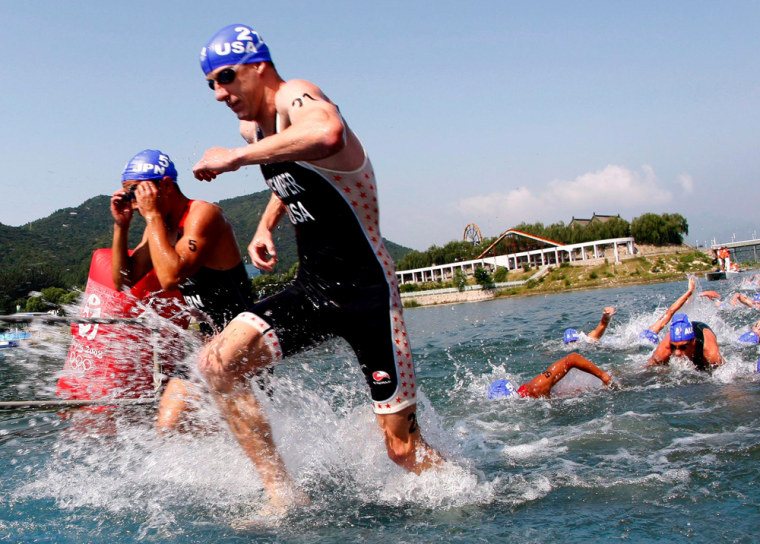When Olympic triathlete Sarah Haskins accepted an invitation by her cousin, an elementary school vice principal, to speak to her students, Haskins didn’t know what to expect.
Evidently, neither did the students.
“My cousin mentioned that an Olympian was coming to the school, and all the kids were excited because they assumed it was Michael Phelps,” Haskins laughed. “Then, when they found out I was a woman, they thought I was Michael Phelps’ wife!”
But Haskins, who says she has spoken to at least 10 schools since returning from Beijing, has found that her own star quality can make a difference.
“You realize, just talking to little kids, what kind of an inspiration you are to them and how much they really look up to you,” Haskins, 27, told TODAYshow.com.
Making a difference
One of the schools Haskins has visited is Maple Grove Elementary School in Dittmer, Mo., where she spoke to students about the importance of running and staying fit earlier this month.
“I received a letter from the principal saying that after my visit, the number of kids joining their run before school program shot through the roof,” Haskins said. “It’s a good feeling to know what I said actually matters.”
Haskins is one of several Olympians using their fame to help raise awareness and money for various charities through Toyota’s Engines of Change program. From autism, which is the issue closest to Haskins’ heart, to a rare disease called A.T., these causes have left the Olympians with little time to rest before hitting the road for speaking engagements and other events.
Among the participants are three gold medal swimmers: Cullen Jones, who is working to increase diversity in swimming; Aaron Peirsol, who is raising awareness about protecting the oceans; and Brendan Hansen, who is raising money for the Leukemia Research Foundation.
Haskins, who now lives in Colorado, is the spokesperson for the nonprofit Train for Autism. The organization holds marathons, runs and walks around the country to raise funds for autism charities.
“My sister works with autistic kids, and I’ve helped her out in the classroom many times,” Haskins said. “This is a very important issue.”
Gaining perspective
For three-time Olympic triathlete and fellow Colorado resident Hunter Kemper, who placed seventh in Beijing, the past two years have been wrought with obstacles. In 2007 he suffered a lower back and hip injury that limited his performance, and throughout this year he has been battling a hernia. He is scheduled to have surgery on Oct. 10.
But, he says, his trials and tribulations were put into perspective by two things: Meeting two children suffering from A.T., and the birth of his son, Davis.
Short for ataxia telangiectasia, A.T. is a genetic disease that causes severe disability and affects about one in 40,000 children.
“To put it in context,” said Kemper, “It’s cystic fibrosis, cerebral palsy, muscular dystrophy and cancer all combined.”

Kemper, 32, first heard about the disease last winter, when he met a family who was struggling with its ramifications.
“They were a couple of triathletes who were going down to Orlando to raise money to donate for A.T. research,” said Kemper. “Two of their daughters, Kate and Olivia, both have it.”
Those suffering from the disease are usually wheelchair-bound by 10 years old, and most die in their teens. Few people know about A.T., but Kemper is determined to change that.
He joined the triathletes’ family for a half-marathon in Orlando, has sold T-shirts to raise money, and has been traveling the country talking to sponsors about the disease.
“Engines of Change has given me a platform to talk about [A.T.]. As an Olympian, I can have a voice for these girls and for other people suffering from the disease,” Kemper explained. “There’s more to life than swimming, biking, running, and for these girls, they don’t even have that opportunity.”
In addition, Kemper says being a father to his 20-month-old son has kept him focused and passionate about doing everything he can to teach people about A.T.
“I think about my son. What if it was him suffering from this disease?” Kemper said. “He doesn’t care if Daddy doesn’t win a gold medal. It doesn’t matter to him. That’s changed my life and my priorities.”